Developmental Theories in 'Parenthood': Julie Buckman Case Study
VerifiedAdded on 2023/06/10
|10
|2464
|56
Case Study
AI Summary
This case study examines Julie Buckman from the film 'Parenthood' as she navigates the transition from young adulthood to parenthood. It identifies major life themes such as parenting and family relationships, applying Jean Piaget's cognitive-developmental theory and Erik Erikson's psychosocial theory to analyze her challenges and strengths. The analysis focuses on Julie's formal operational stage, her relationship with Todd, and the psychosocial crisis she faces, highlighting the impact of her decisions on her development. The case study concludes that Julie's journey exemplifies the complexities of developmental transitions, providing insights into the interplay between cognitive reasoning, intimate relationships, and personal growth.
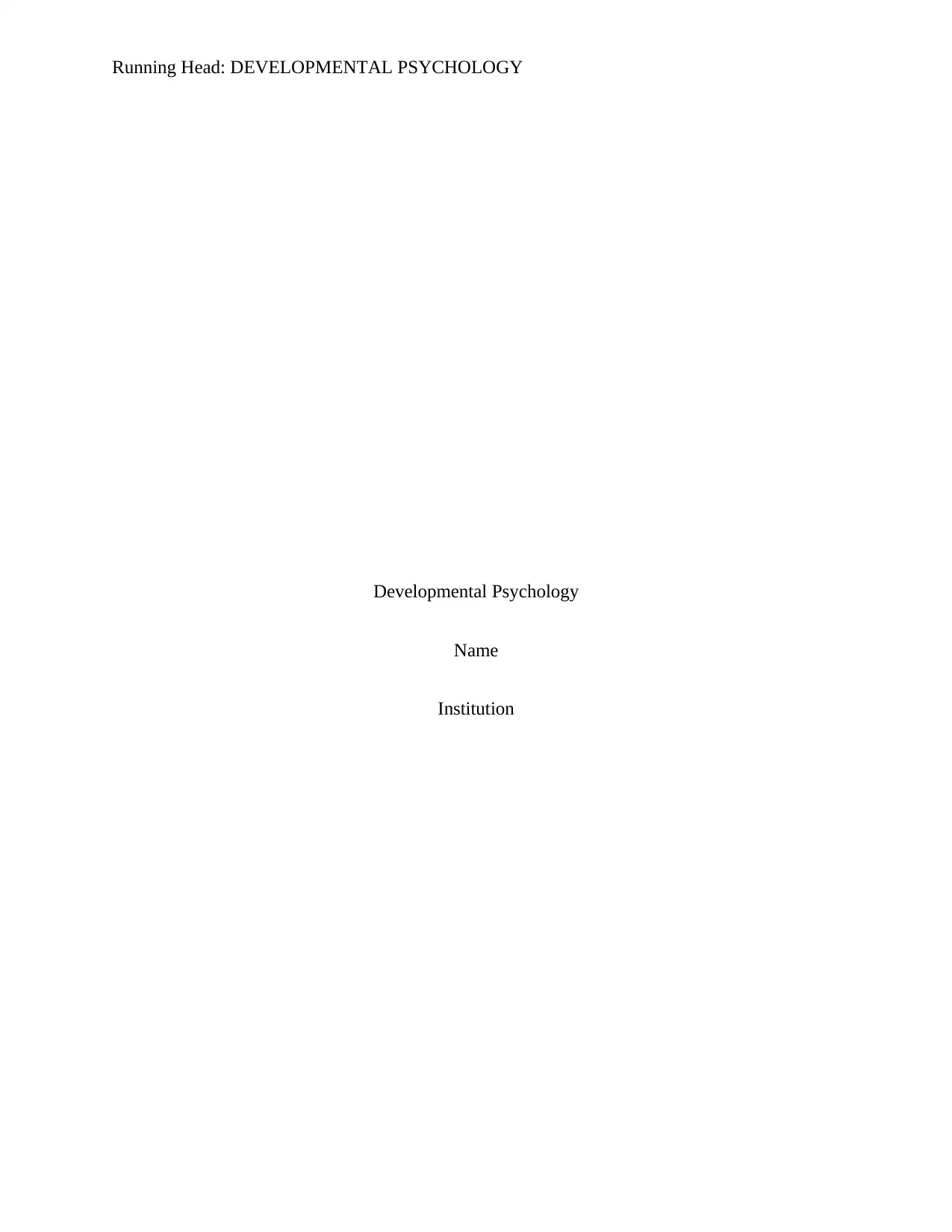
Running Head: DEVELOPMENTAL PSYCHOLOGY
Developmental Psychology
Name
Institution
Developmental Psychology
Name
Institution
Paraphrase This Document
Need a fresh take? Get an instant paraphrase of this document with our AI Paraphraser
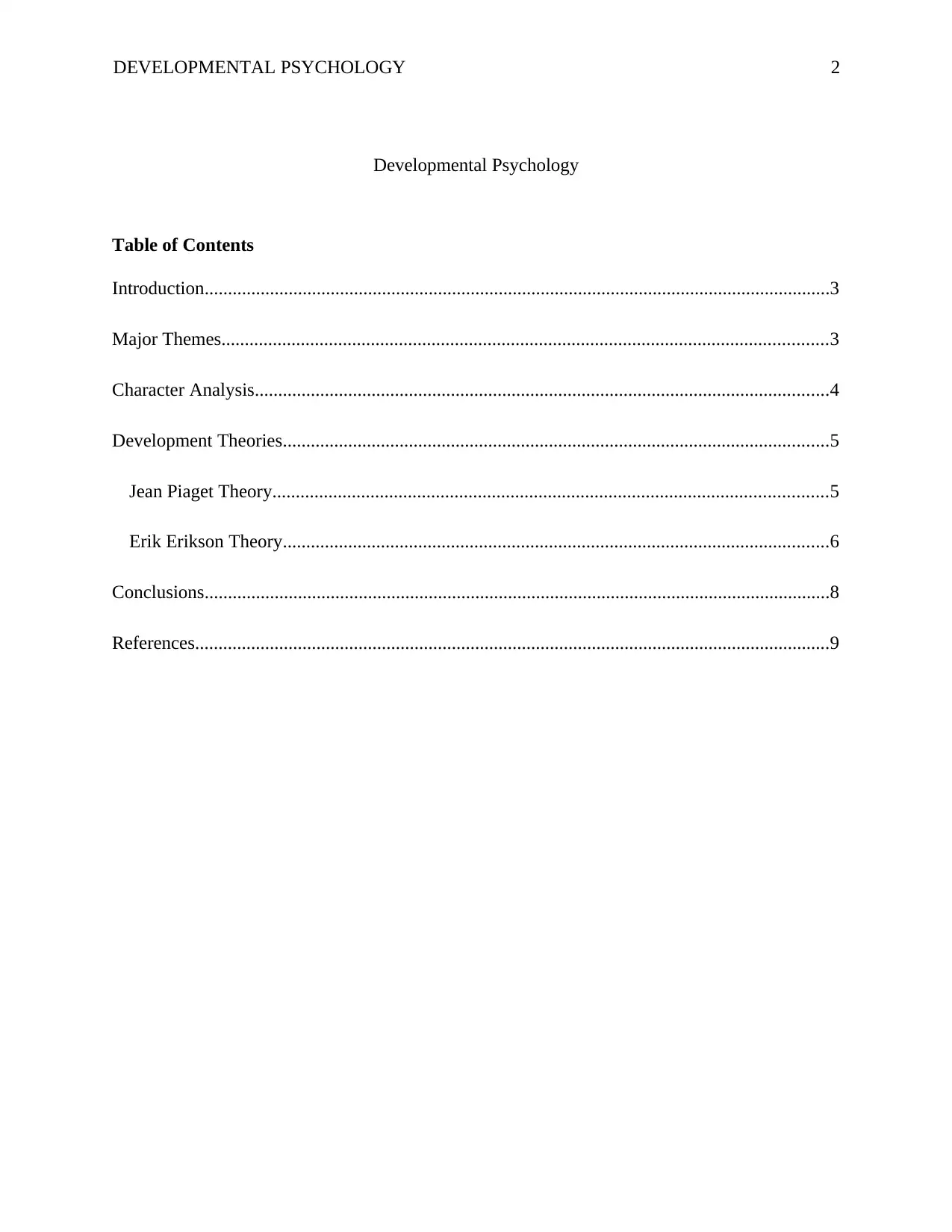
DEVELOPMENTAL PSYCHOLOGY 2
Developmental Psychology
Table of Contents
Introduction......................................................................................................................................3
Major Themes..................................................................................................................................3
Character Analysis...........................................................................................................................4
Development Theories.....................................................................................................................5
Jean Piaget Theory.......................................................................................................................5
Erik Erikson Theory.....................................................................................................................6
Conclusions......................................................................................................................................8
References........................................................................................................................................9
Developmental Psychology
Table of Contents
Introduction......................................................................................................................................3
Major Themes..................................................................................................................................3
Character Analysis...........................................................................................................................4
Development Theories.....................................................................................................................5
Jean Piaget Theory.......................................................................................................................5
Erik Erikson Theory.....................................................................................................................6
Conclusions......................................................................................................................................8
References........................................................................................................................................9
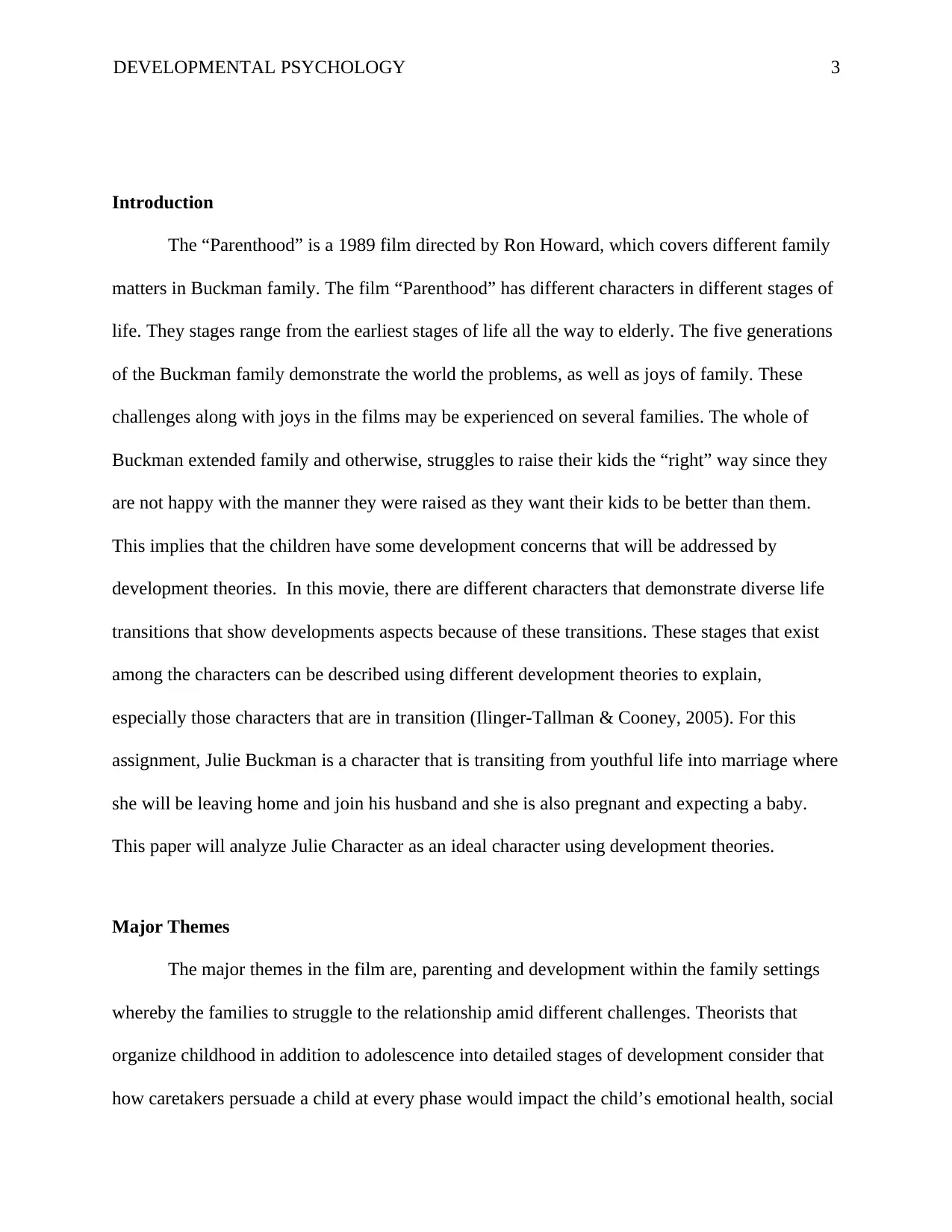
DEVELOPMENTAL PSYCHOLOGY 3
Introduction
The “Parenthood” is a 1989 film directed by Ron Howard, which covers different family
matters in Buckman family. The film “Parenthood” has different characters in different stages of
life. They stages range from the earliest stages of life all the way to elderly. The five generations
of the Buckman family demonstrate the world the problems, as well as joys of family. These
challenges along with joys in the films may be experienced on several families. The whole of
Buckman extended family and otherwise, struggles to raise their kids the “right” way since they
are not happy with the manner they were raised as they want their kids to be better than them.
This implies that the children have some development concerns that will be addressed by
development theories. In this movie, there are different characters that demonstrate diverse life
transitions that show developments aspects because of these transitions. These stages that exist
among the characters can be described using different development theories to explain,
especially those characters that are in transition (Ilinger-Tallman & Cooney, 2005). For this
assignment, Julie Buckman is a character that is transiting from youthful life into marriage where
she will be leaving home and join his husband and she is also pregnant and expecting a baby.
This paper will analyze Julie Character as an ideal character using development theories.
Major Themes
The major themes in the film are, parenting and development within the family settings
whereby the families to struggle to the relationship amid different challenges. Theorists that
organize childhood in addition to adolescence into detailed stages of development consider that
how caretakers persuade a child at every phase would impact the child’s emotional health, social
Introduction
The “Parenthood” is a 1989 film directed by Ron Howard, which covers different family
matters in Buckman family. The film “Parenthood” has different characters in different stages of
life. They stages range from the earliest stages of life all the way to elderly. The five generations
of the Buckman family demonstrate the world the problems, as well as joys of family. These
challenges along with joys in the films may be experienced on several families. The whole of
Buckman extended family and otherwise, struggles to raise their kids the “right” way since they
are not happy with the manner they were raised as they want their kids to be better than them.
This implies that the children have some development concerns that will be addressed by
development theories. In this movie, there are different characters that demonstrate diverse life
transitions that show developments aspects because of these transitions. These stages that exist
among the characters can be described using different development theories to explain,
especially those characters that are in transition (Ilinger-Tallman & Cooney, 2005). For this
assignment, Julie Buckman is a character that is transiting from youthful life into marriage where
she will be leaving home and join his husband and she is also pregnant and expecting a baby.
This paper will analyze Julie Character as an ideal character using development theories.
Major Themes
The major themes in the film are, parenting and development within the family settings
whereby the families to struggle to the relationship amid different challenges. Theorists that
organize childhood in addition to adolescence into detailed stages of development consider that
how caretakers persuade a child at every phase would impact the child’s emotional health, social
⊘ This is a preview!⊘
Do you want full access?
Subscribe today to unlock all pages.

Trusted by 1+ million students worldwide
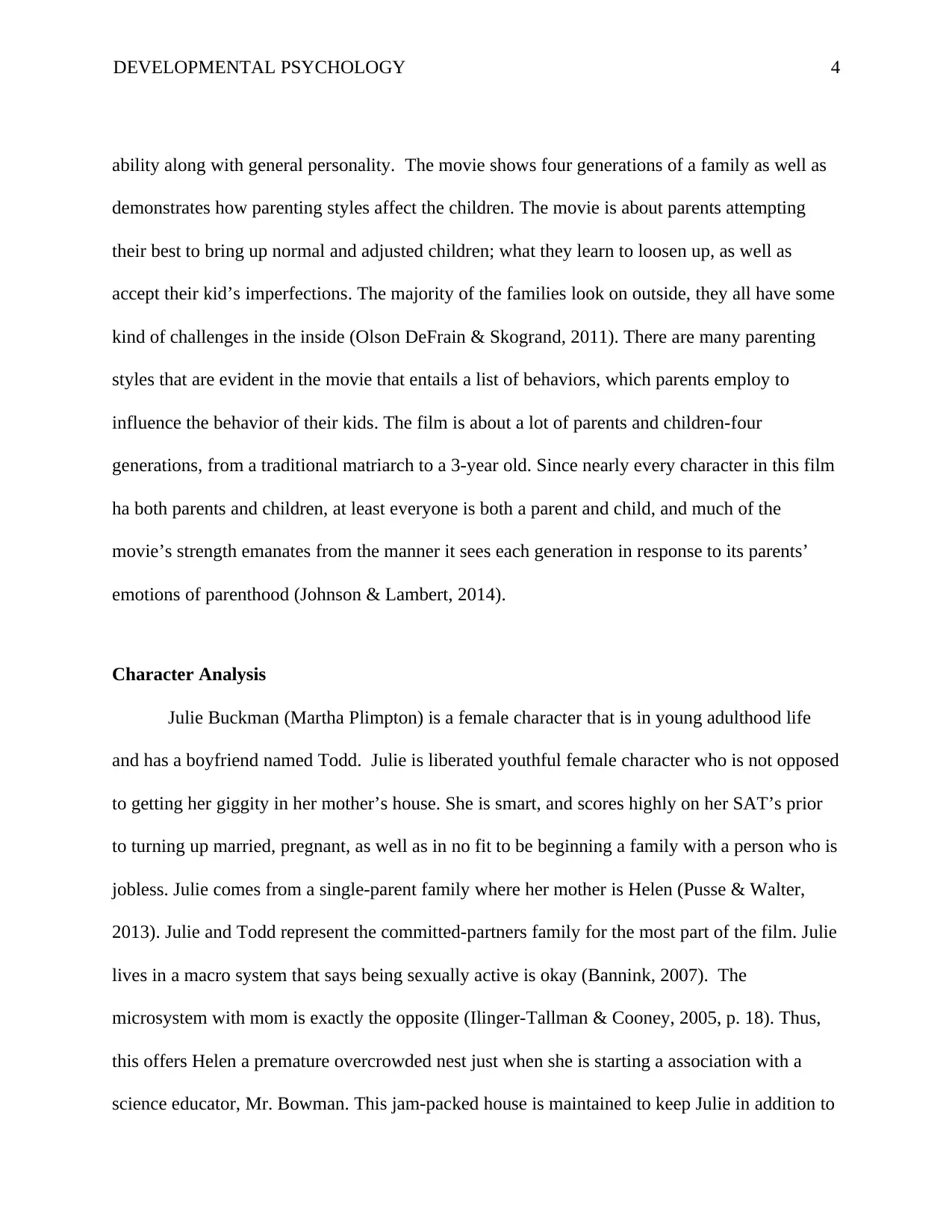
DEVELOPMENTAL PSYCHOLOGY 4
ability along with general personality. The movie shows four generations of a family as well as
demonstrates how parenting styles affect the children. The movie is about parents attempting
their best to bring up normal and adjusted children; what they learn to loosen up, as well as
accept their kid’s imperfections. The majority of the families look on outside, they all have some
kind of challenges in the inside (Olson DeFrain & Skogrand, 2011). There are many parenting
styles that are evident in the movie that entails a list of behaviors, which parents employ to
influence the behavior of their kids. The film is about a lot of parents and children-four
generations, from a traditional matriarch to a 3-year old. Since nearly every character in this film
ha both parents and children, at least everyone is both a parent and child, and much of the
movie’s strength emanates from the manner it sees each generation in response to its parents’
emotions of parenthood (Johnson & Lambert, 2014).
Character Analysis
Julie Buckman (Martha Plimpton) is a female character that is in young adulthood life
and has a boyfriend named Todd. Julie is liberated youthful female character who is not opposed
to getting her giggity in her mother’s house. She is smart, and scores highly on her SAT’s prior
to turning up married, pregnant, as well as in no fit to be beginning a family with a person who is
jobless. Julie comes from a single-parent family where her mother is Helen (Pusse & Walter,
2013). Julie and Todd represent the committed-partners family for the most part of the film. Julie
lives in a macro system that says being sexually active is okay (Bannink, 2007). The
microsystem with mom is exactly the opposite (Ilinger-Tallman & Cooney, 2005, p. 18). Thus,
this offers Helen a premature overcrowded nest just when she is starting a association with a
science educator, Mr. Bowman. This jam-packed house is maintained to keep Julie in addition to
ability along with general personality. The movie shows four generations of a family as well as
demonstrates how parenting styles affect the children. The movie is about parents attempting
their best to bring up normal and adjusted children; what they learn to loosen up, as well as
accept their kid’s imperfections. The majority of the families look on outside, they all have some
kind of challenges in the inside (Olson DeFrain & Skogrand, 2011). There are many parenting
styles that are evident in the movie that entails a list of behaviors, which parents employ to
influence the behavior of their kids. The film is about a lot of parents and children-four
generations, from a traditional matriarch to a 3-year old. Since nearly every character in this film
ha both parents and children, at least everyone is both a parent and child, and much of the
movie’s strength emanates from the manner it sees each generation in response to its parents’
emotions of parenthood (Johnson & Lambert, 2014).
Character Analysis
Julie Buckman (Martha Plimpton) is a female character that is in young adulthood life
and has a boyfriend named Todd. Julie is liberated youthful female character who is not opposed
to getting her giggity in her mother’s house. She is smart, and scores highly on her SAT’s prior
to turning up married, pregnant, as well as in no fit to be beginning a family with a person who is
jobless. Julie comes from a single-parent family where her mother is Helen (Pusse & Walter,
2013). Julie and Todd represent the committed-partners family for the most part of the film. Julie
lives in a macro system that says being sexually active is okay (Bannink, 2007). The
microsystem with mom is exactly the opposite (Ilinger-Tallman & Cooney, 2005, p. 18). Thus,
this offers Helen a premature overcrowded nest just when she is starting a association with a
science educator, Mr. Bowman. This jam-packed house is maintained to keep Julie in addition to
Paraphrase This Document
Need a fresh take? Get an instant paraphrase of this document with our AI Paraphraser
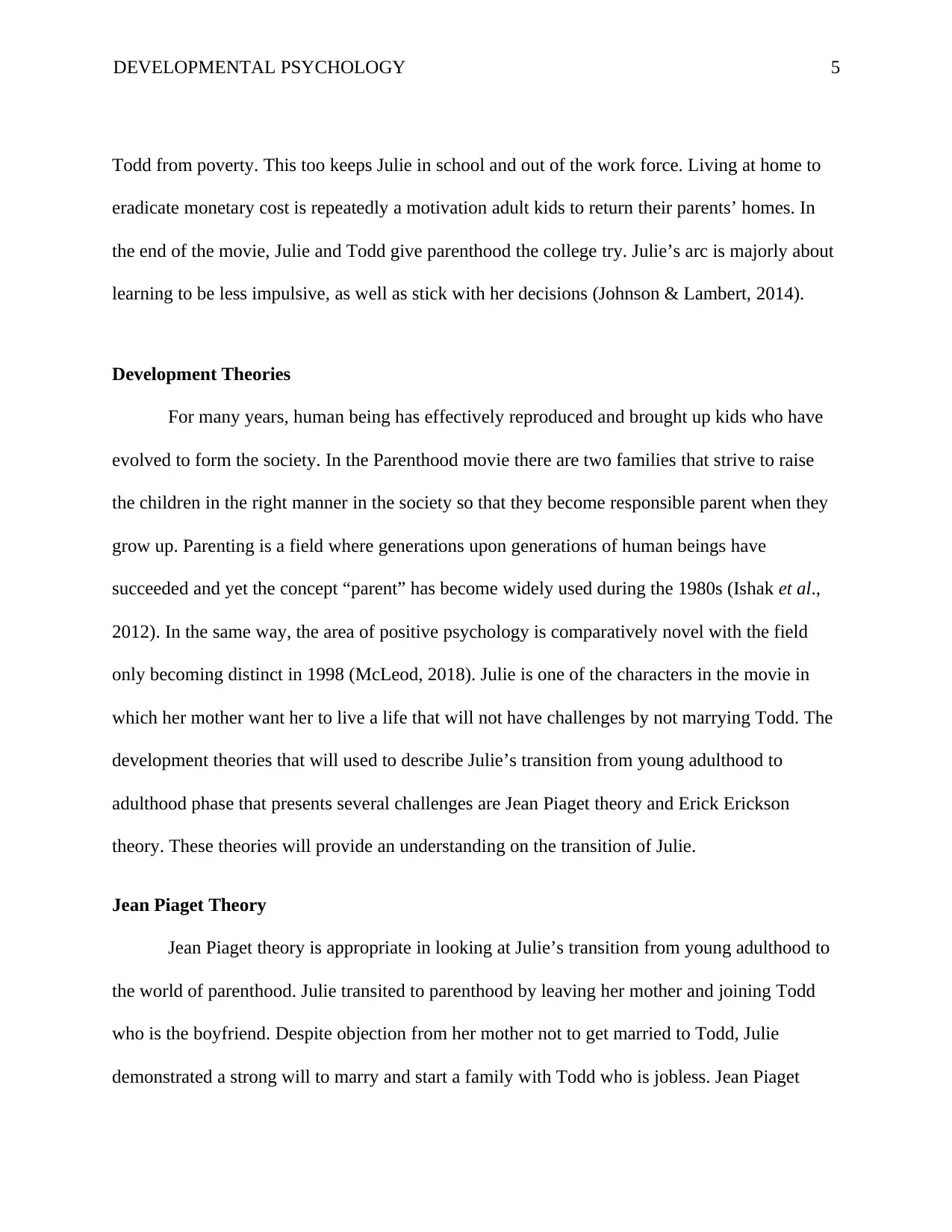
DEVELOPMENTAL PSYCHOLOGY 5
Todd from poverty. This too keeps Julie in school and out of the work force. Living at home to
eradicate monetary cost is repeatedly a motivation adult kids to return their parents’ homes. In
the end of the movie, Julie and Todd give parenthood the college try. Julie’s arc is majorly about
learning to be less impulsive, as well as stick with her decisions (Johnson & Lambert, 2014).
Development Theories
For many years, human being has effectively reproduced and brought up kids who have
evolved to form the society. In the Parenthood movie there are two families that strive to raise
the children in the right manner in the society so that they become responsible parent when they
grow up. Parenting is a field where generations upon generations of human beings have
succeeded and yet the concept “parent” has become widely used during the 1980s (Ishak et al.,
2012). In the same way, the area of positive psychology is comparatively novel with the field
only becoming distinct in 1998 (McLeod, 2018). Julie is one of the characters in the movie in
which her mother want her to live a life that will not have challenges by not marrying Todd. The
development theories that will used to describe Julie’s transition from young adulthood to
adulthood phase that presents several challenges are Jean Piaget theory and Erick Erickson
theory. These theories will provide an understanding on the transition of Julie.
Jean Piaget Theory
Jean Piaget theory is appropriate in looking at Julie’s transition from young adulthood to
the world of parenthood. Julie transited to parenthood by leaving her mother and joining Todd
who is the boyfriend. Despite objection from her mother not to get married to Todd, Julie
demonstrated a strong will to marry and start a family with Todd who is jobless. Jean Piaget
Todd from poverty. This too keeps Julie in school and out of the work force. Living at home to
eradicate monetary cost is repeatedly a motivation adult kids to return their parents’ homes. In
the end of the movie, Julie and Todd give parenthood the college try. Julie’s arc is majorly about
learning to be less impulsive, as well as stick with her decisions (Johnson & Lambert, 2014).
Development Theories
For many years, human being has effectively reproduced and brought up kids who have
evolved to form the society. In the Parenthood movie there are two families that strive to raise
the children in the right manner in the society so that they become responsible parent when they
grow up. Parenting is a field where generations upon generations of human beings have
succeeded and yet the concept “parent” has become widely used during the 1980s (Ishak et al.,
2012). In the same way, the area of positive psychology is comparatively novel with the field
only becoming distinct in 1998 (McLeod, 2018). Julie is one of the characters in the movie in
which her mother want her to live a life that will not have challenges by not marrying Todd. The
development theories that will used to describe Julie’s transition from young adulthood to
adulthood phase that presents several challenges are Jean Piaget theory and Erick Erickson
theory. These theories will provide an understanding on the transition of Julie.
Jean Piaget Theory
Jean Piaget theory is appropriate in looking at Julie’s transition from young adulthood to
the world of parenthood. Julie transited to parenthood by leaving her mother and joining Todd
who is the boyfriend. Despite objection from her mother not to get married to Todd, Julie
demonstrated a strong will to marry and start a family with Todd who is jobless. Jean Piaget
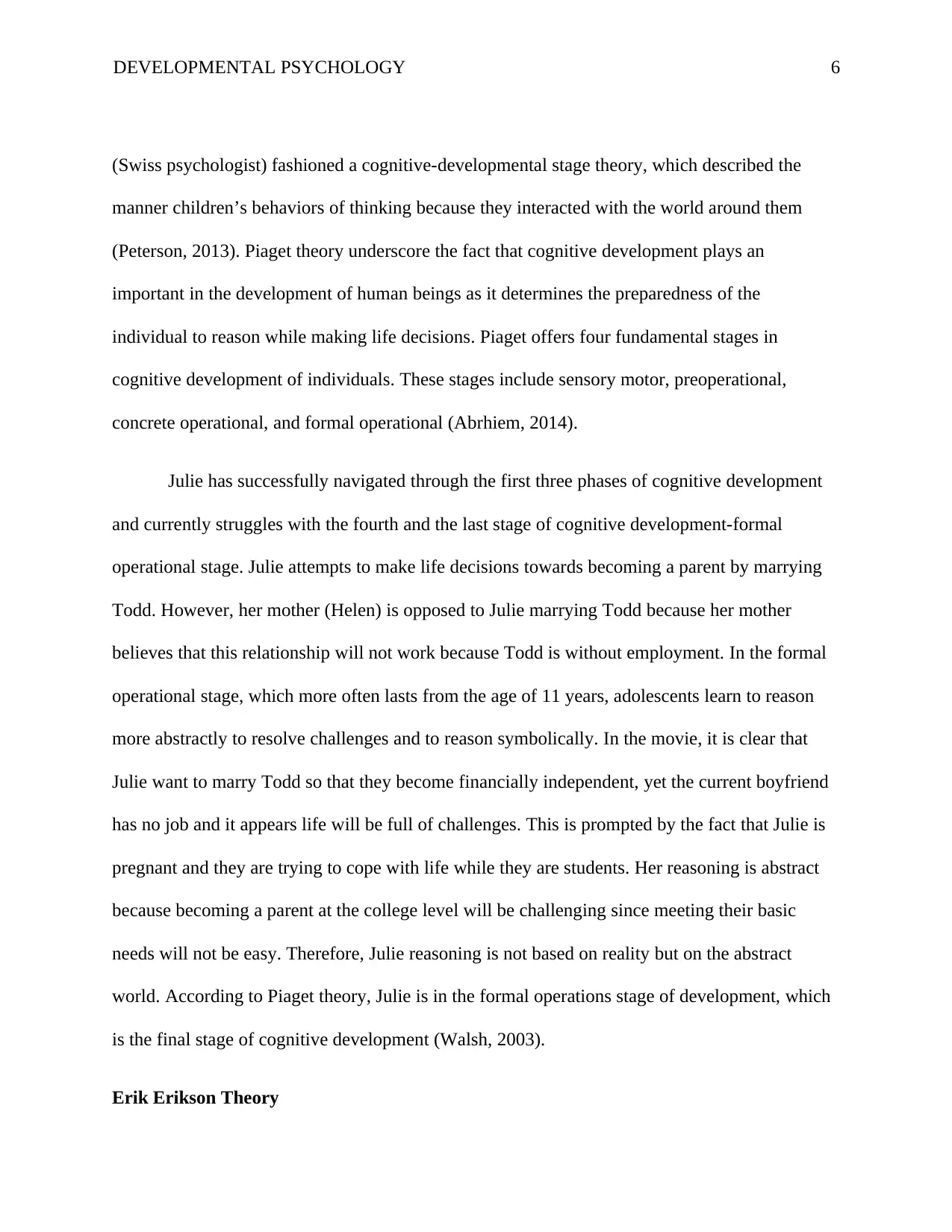
DEVELOPMENTAL PSYCHOLOGY 6
(Swiss psychologist) fashioned a cognitive-developmental stage theory, which described the
manner children’s behaviors of thinking because they interacted with the world around them
(Peterson, 2013). Piaget theory underscore the fact that cognitive development plays an
important in the development of human beings as it determines the preparedness of the
individual to reason while making life decisions. Piaget offers four fundamental stages in
cognitive development of individuals. These stages include sensory motor, preoperational,
concrete operational, and formal operational (Abrhiem, 2014).
Julie has successfully navigated through the first three phases of cognitive development
and currently struggles with the fourth and the last stage of cognitive development-formal
operational stage. Julie attempts to make life decisions towards becoming a parent by marrying
Todd. However, her mother (Helen) is opposed to Julie marrying Todd because her mother
believes that this relationship will not work because Todd is without employment. In the formal
operational stage, which more often lasts from the age of 11 years, adolescents learn to reason
more abstractly to resolve challenges and to reason symbolically. In the movie, it is clear that
Julie want to marry Todd so that they become financially independent, yet the current boyfriend
has no job and it appears life will be full of challenges. This is prompted by the fact that Julie is
pregnant and they are trying to cope with life while they are students. Her reasoning is abstract
because becoming a parent at the college level will be challenging since meeting their basic
needs will not be easy. Therefore, Julie reasoning is not based on reality but on the abstract
world. According to Piaget theory, Julie is in the formal operations stage of development, which
is the final stage of cognitive development (Walsh, 2003).
Erik Erikson Theory
(Swiss psychologist) fashioned a cognitive-developmental stage theory, which described the
manner children’s behaviors of thinking because they interacted with the world around them
(Peterson, 2013). Piaget theory underscore the fact that cognitive development plays an
important in the development of human beings as it determines the preparedness of the
individual to reason while making life decisions. Piaget offers four fundamental stages in
cognitive development of individuals. These stages include sensory motor, preoperational,
concrete operational, and formal operational (Abrhiem, 2014).
Julie has successfully navigated through the first three phases of cognitive development
and currently struggles with the fourth and the last stage of cognitive development-formal
operational stage. Julie attempts to make life decisions towards becoming a parent by marrying
Todd. However, her mother (Helen) is opposed to Julie marrying Todd because her mother
believes that this relationship will not work because Todd is without employment. In the formal
operational stage, which more often lasts from the age of 11 years, adolescents learn to reason
more abstractly to resolve challenges and to reason symbolically. In the movie, it is clear that
Julie want to marry Todd so that they become financially independent, yet the current boyfriend
has no job and it appears life will be full of challenges. This is prompted by the fact that Julie is
pregnant and they are trying to cope with life while they are students. Her reasoning is abstract
because becoming a parent at the college level will be challenging since meeting their basic
needs will not be easy. Therefore, Julie reasoning is not based on reality but on the abstract
world. According to Piaget theory, Julie is in the formal operations stage of development, which
is the final stage of cognitive development (Walsh, 2003).
Erik Erikson Theory
⊘ This is a preview!⊘
Do you want full access?
Subscribe today to unlock all pages.

Trusted by 1+ million students worldwide
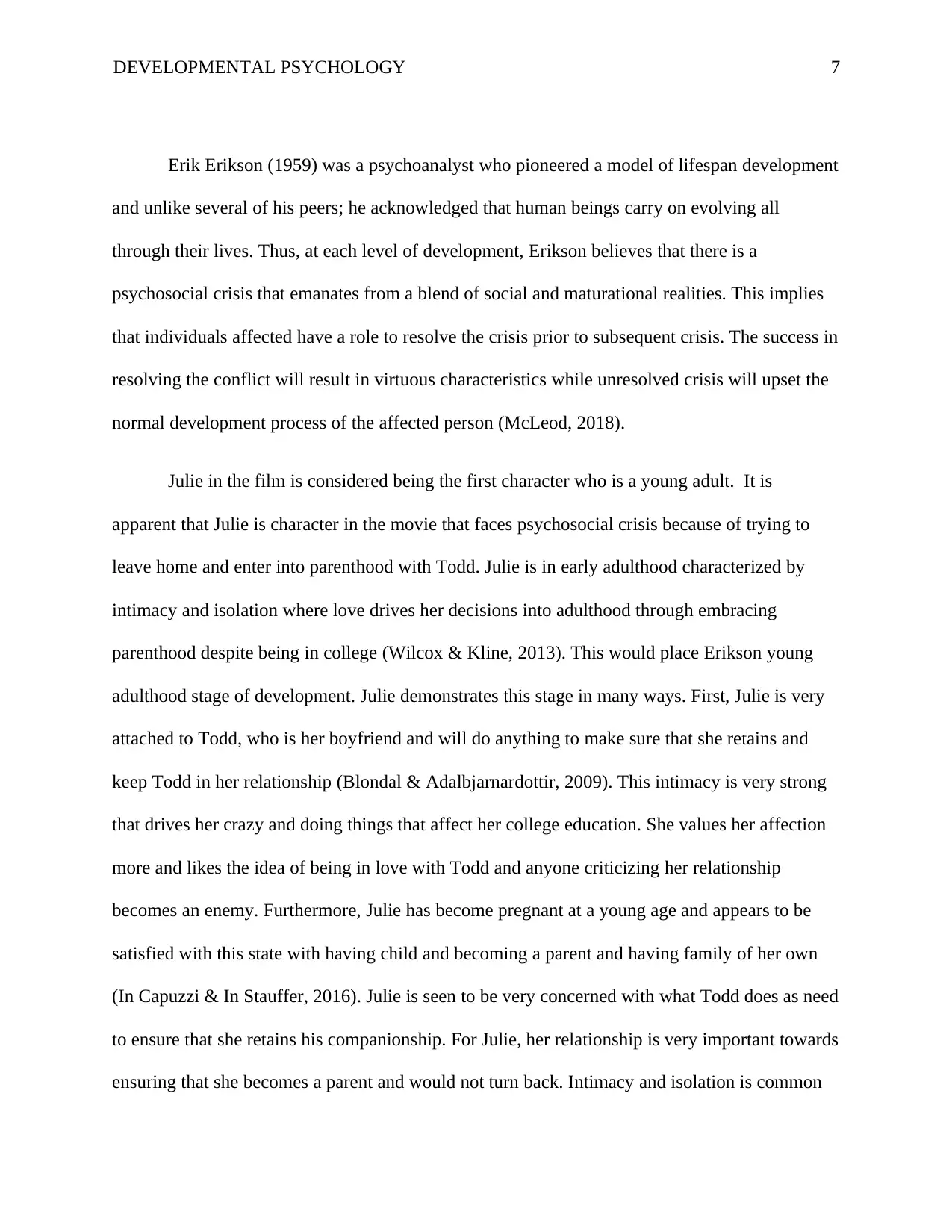
DEVELOPMENTAL PSYCHOLOGY 7
Erik Erikson (1959) was a psychoanalyst who pioneered a model of lifespan development
and unlike several of his peers; he acknowledged that human beings carry on evolving all
through their lives. Thus, at each level of development, Erikson believes that there is a
psychosocial crisis that emanates from a blend of social and maturational realities. This implies
that individuals affected have a role to resolve the crisis prior to subsequent crisis. The success in
resolving the conflict will result in virtuous characteristics while unresolved crisis will upset the
normal development process of the affected person (McLeod, 2018).
Julie in the film is considered being the first character who is a young adult. It is
apparent that Julie is character in the movie that faces psychosocial crisis because of trying to
leave home and enter into parenthood with Todd. Julie is in early adulthood characterized by
intimacy and isolation where love drives her decisions into adulthood through embracing
parenthood despite being in college (Wilcox & Kline, 2013). This would place Erikson young
adulthood stage of development. Julie demonstrates this stage in many ways. First, Julie is very
attached to Todd, who is her boyfriend and will do anything to make sure that she retains and
keep Todd in her relationship (Blondal & Adalbjarnardottir, 2009). This intimacy is very strong
that drives her crazy and doing things that affect her college education. She values her affection
more and likes the idea of being in love with Todd and anyone criticizing her relationship
becomes an enemy. Furthermore, Julie has become pregnant at a young age and appears to be
satisfied with this state with having child and becoming a parent and having family of her own
(In Capuzzi & In Stauffer, 2016). Julie is seen to be very concerned with what Todd does as need
to ensure that she retains his companionship. For Julie, her relationship is very important towards
ensuring that she becomes a parent and would not turn back. Intimacy and isolation is common
Erik Erikson (1959) was a psychoanalyst who pioneered a model of lifespan development
and unlike several of his peers; he acknowledged that human beings carry on evolving all
through their lives. Thus, at each level of development, Erikson believes that there is a
psychosocial crisis that emanates from a blend of social and maturational realities. This implies
that individuals affected have a role to resolve the crisis prior to subsequent crisis. The success in
resolving the conflict will result in virtuous characteristics while unresolved crisis will upset the
normal development process of the affected person (McLeod, 2018).
Julie in the film is considered being the first character who is a young adult. It is
apparent that Julie is character in the movie that faces psychosocial crisis because of trying to
leave home and enter into parenthood with Todd. Julie is in early adulthood characterized by
intimacy and isolation where love drives her decisions into adulthood through embracing
parenthood despite being in college (Wilcox & Kline, 2013). This would place Erikson young
adulthood stage of development. Julie demonstrates this stage in many ways. First, Julie is very
attached to Todd, who is her boyfriend and will do anything to make sure that she retains and
keep Todd in her relationship (Blondal & Adalbjarnardottir, 2009). This intimacy is very strong
that drives her crazy and doing things that affect her college education. She values her affection
more and likes the idea of being in love with Todd and anyone criticizing her relationship
becomes an enemy. Furthermore, Julie has become pregnant at a young age and appears to be
satisfied with this state with having child and becoming a parent and having family of her own
(In Capuzzi & In Stauffer, 2016). Julie is seen to be very concerned with what Todd does as need
to ensure that she retains his companionship. For Julie, her relationship is very important towards
ensuring that she becomes a parent and would not turn back. Intimacy and isolation is common
Paraphrase This Document
Need a fresh take? Get an instant paraphrase of this document with our AI Paraphraser
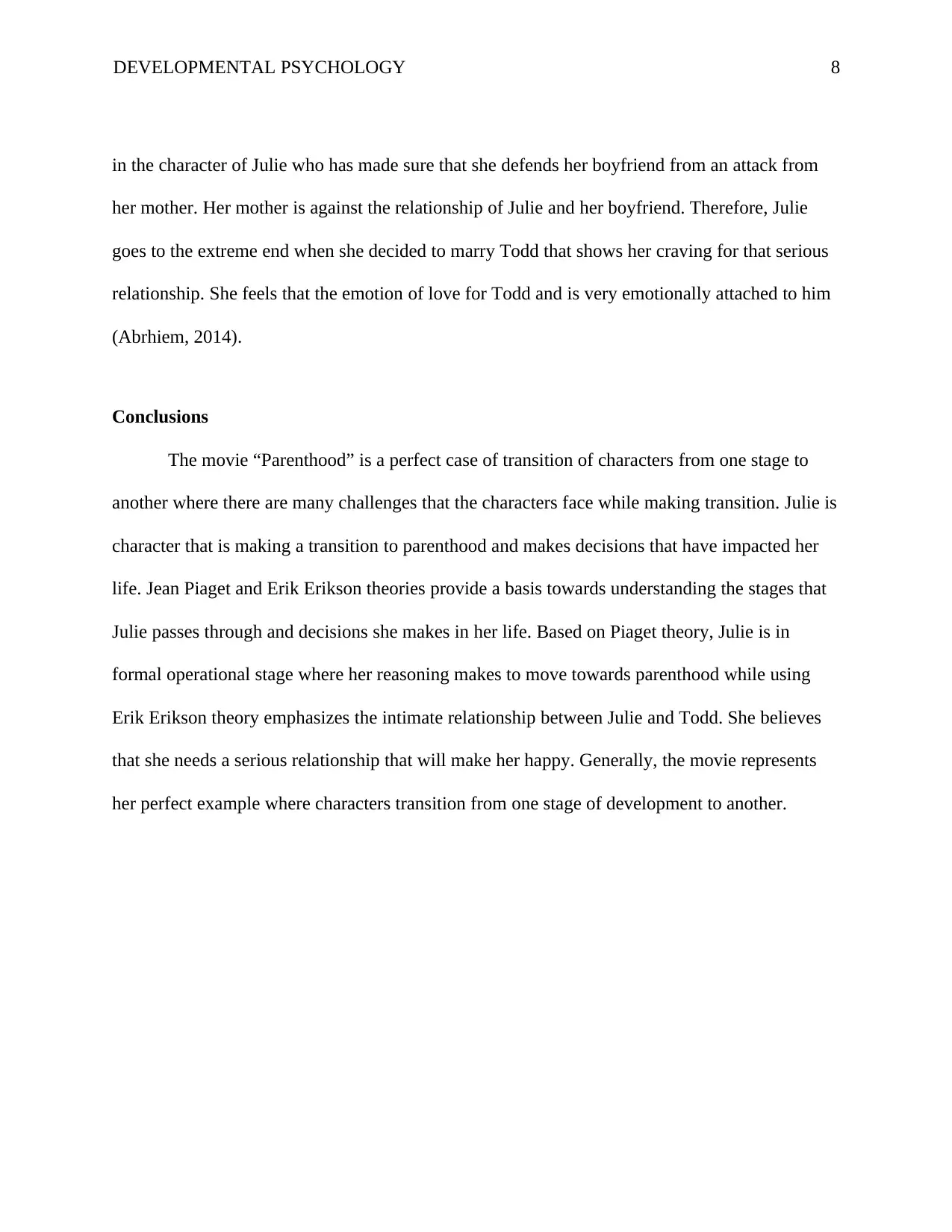
DEVELOPMENTAL PSYCHOLOGY 8
in the character of Julie who has made sure that she defends her boyfriend from an attack from
her mother. Her mother is against the relationship of Julie and her boyfriend. Therefore, Julie
goes to the extreme end when she decided to marry Todd that shows her craving for that serious
relationship. She feels that the emotion of love for Todd and is very emotionally attached to him
(Abrhiem, 2014).
Conclusions
The movie “Parenthood” is a perfect case of transition of characters from one stage to
another where there are many challenges that the characters face while making transition. Julie is
character that is making a transition to parenthood and makes decisions that have impacted her
life. Jean Piaget and Erik Erikson theories provide a basis towards understanding the stages that
Julie passes through and decisions she makes in her life. Based on Piaget theory, Julie is in
formal operational stage where her reasoning makes to move towards parenthood while using
Erik Erikson theory emphasizes the intimate relationship between Julie and Todd. She believes
that she needs a serious relationship that will make her happy. Generally, the movie represents
her perfect example where characters transition from one stage of development to another.
in the character of Julie who has made sure that she defends her boyfriend from an attack from
her mother. Her mother is against the relationship of Julie and her boyfriend. Therefore, Julie
goes to the extreme end when she decided to marry Todd that shows her craving for that serious
relationship. She feels that the emotion of love for Todd and is very emotionally attached to him
(Abrhiem, 2014).
Conclusions
The movie “Parenthood” is a perfect case of transition of characters from one stage to
another where there are many challenges that the characters face while making transition. Julie is
character that is making a transition to parenthood and makes decisions that have impacted her
life. Jean Piaget and Erik Erikson theories provide a basis towards understanding the stages that
Julie passes through and decisions she makes in her life. Based on Piaget theory, Julie is in
formal operational stage where her reasoning makes to move towards parenthood while using
Erik Erikson theory emphasizes the intimate relationship between Julie and Todd. She believes
that she needs a serious relationship that will make her happy. Generally, the movie represents
her perfect example where characters transition from one stage of development to another.
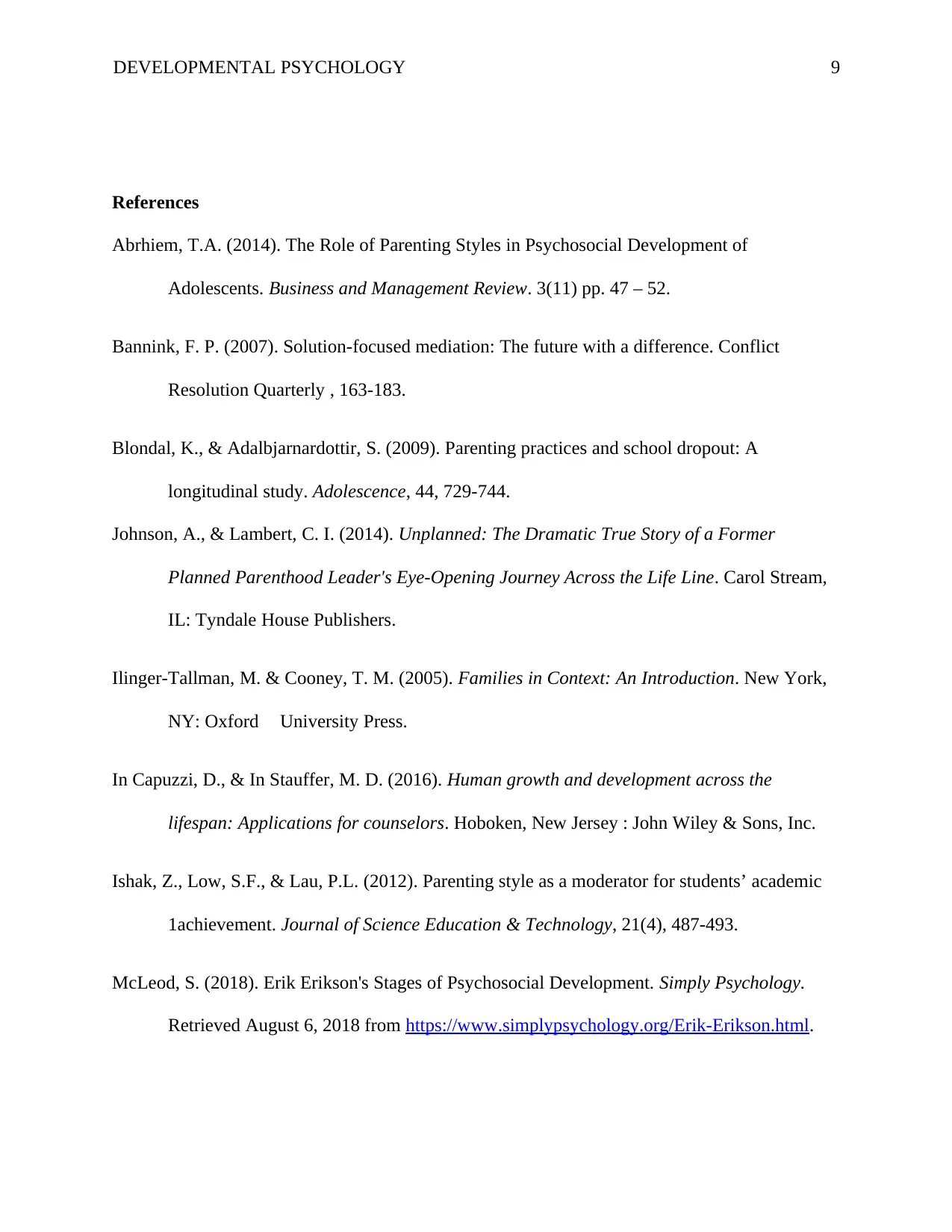
DEVELOPMENTAL PSYCHOLOGY 9
References
Abrhiem, T.A. (2014). The Role of Parenting Styles in Psychosocial Development of
Adolescents. Business and Management Review. 3(11) pp. 47 – 52.
Bannink, F. P. (2007). Solution-focused mediation: The future with a difference. Conflict
Resolution Quarterly , 163-183.
Blondal, K., & Adalbjarnardottir, S. (2009). Parenting practices and school dropout: A
longitudinal study. Adolescence, 44, 729-744.
Johnson, A., & Lambert, C. I. (2014). Unplanned: The Dramatic True Story of a Former
Planned Parenthood Leader's Eye-Opening Journey Across the Life Line. Carol Stream,
IL: Tyndale House Publishers.
Ilinger-Tallman, M. & Cooney, T. M. (2005). Families in Context: An Introduction. New York,
NY: Oxford University Press.
In Capuzzi, D., & In Stauffer, M. D. (2016). Human growth and development across the
lifespan: Applications for counselors. Hoboken, New Jersey : John Wiley & Sons, Inc.
Ishak, Z., Low, S.F., & Lau, P.L. (2012). Parenting style as a moderator for students’ academic
1achievement. Journal of Science Education & Technology, 21(4), 487-493.
McLeod, S. (2018). Erik Erikson's Stages of Psychosocial Development. Simply Psychology.
Retrieved August 6, 2018 from https://www.simplypsychology.org/Erik-Erikson.html.
References
Abrhiem, T.A. (2014). The Role of Parenting Styles in Psychosocial Development of
Adolescents. Business and Management Review. 3(11) pp. 47 – 52.
Bannink, F. P. (2007). Solution-focused mediation: The future with a difference. Conflict
Resolution Quarterly , 163-183.
Blondal, K., & Adalbjarnardottir, S. (2009). Parenting practices and school dropout: A
longitudinal study. Adolescence, 44, 729-744.
Johnson, A., & Lambert, C. I. (2014). Unplanned: The Dramatic True Story of a Former
Planned Parenthood Leader's Eye-Opening Journey Across the Life Line. Carol Stream,
IL: Tyndale House Publishers.
Ilinger-Tallman, M. & Cooney, T. M. (2005). Families in Context: An Introduction. New York,
NY: Oxford University Press.
In Capuzzi, D., & In Stauffer, M. D. (2016). Human growth and development across the
lifespan: Applications for counselors. Hoboken, New Jersey : John Wiley & Sons, Inc.
Ishak, Z., Low, S.F., & Lau, P.L. (2012). Parenting style as a moderator for students’ academic
1achievement. Journal of Science Education & Technology, 21(4), 487-493.
McLeod, S. (2018). Erik Erikson's Stages of Psychosocial Development. Simply Psychology.
Retrieved August 6, 2018 from https://www.simplypsychology.org/Erik-Erikson.html.
⊘ This is a preview!⊘
Do you want full access?
Subscribe today to unlock all pages.

Trusted by 1+ million students worldwide
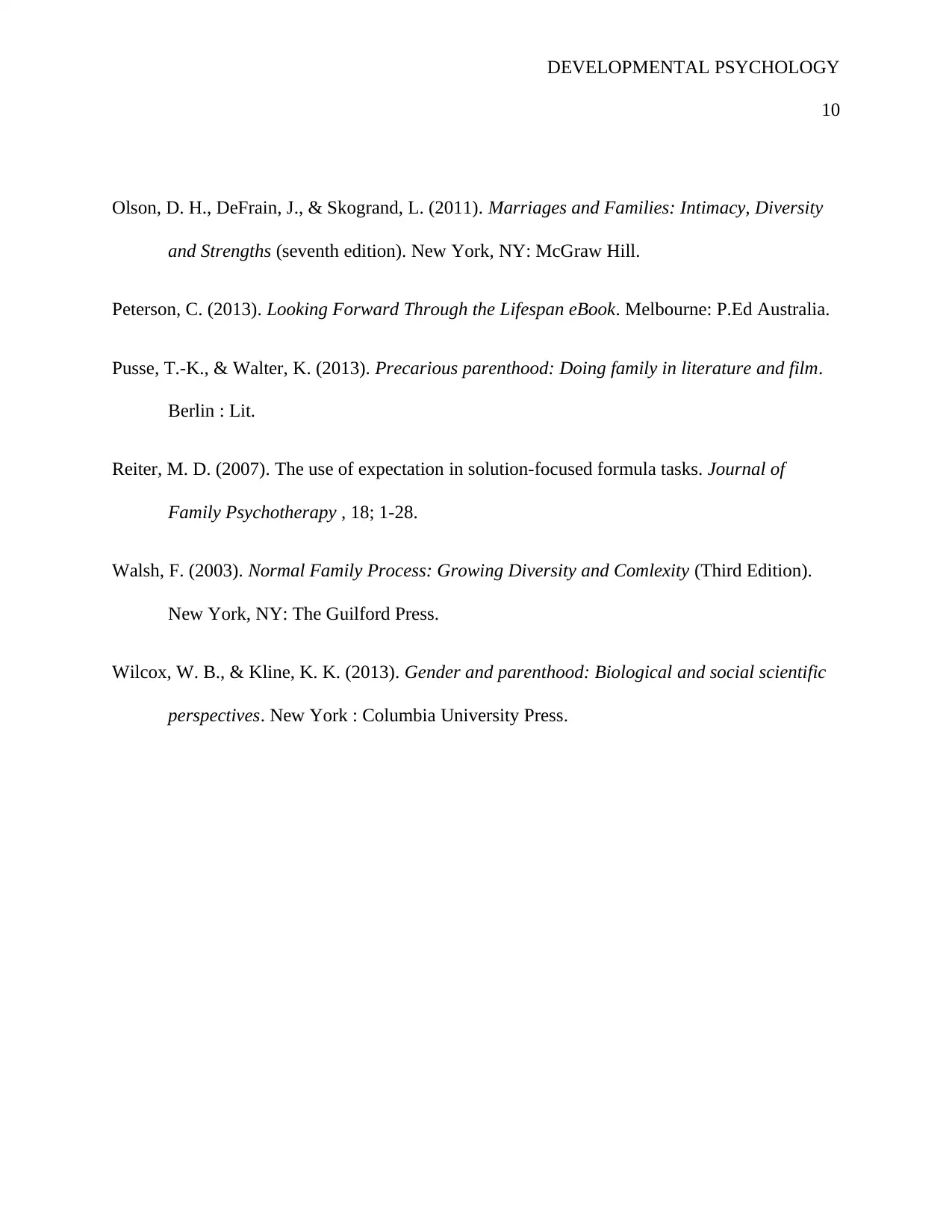
DEVELOPMENTAL PSYCHOLOGY
10
Olson, D. H., DeFrain, J., & Skogrand, L. (2011). Marriages and Families: Intimacy, Diversity
and Strengths (seventh edition). New York, NY: McGraw Hill.
Peterson, C. (2013). Looking Forward Through the Lifespan eBook. Melbourne: P.Ed Australia.
Pusse, T.-K., & Walter, K. (2013). Precarious parenthood: Doing family in literature and film.
Berlin : Lit.
Reiter, M. D. (2007). The use of expectation in solution-focused formula tasks. Journal of
Family Psychotherapy , 18; 1-28.
Walsh, F. (2003). Normal Family Process: Growing Diversity and Comlexity (Third Edition).
New York, NY: The Guilford Press.
Wilcox, W. B., & Kline, K. K. (2013). Gender and parenthood: Biological and social scientific
perspectives. New York : Columbia University Press.
10
Olson, D. H., DeFrain, J., & Skogrand, L. (2011). Marriages and Families: Intimacy, Diversity
and Strengths (seventh edition). New York, NY: McGraw Hill.
Peterson, C. (2013). Looking Forward Through the Lifespan eBook. Melbourne: P.Ed Australia.
Pusse, T.-K., & Walter, K. (2013). Precarious parenthood: Doing family in literature and film.
Berlin : Lit.
Reiter, M. D. (2007). The use of expectation in solution-focused formula tasks. Journal of
Family Psychotherapy , 18; 1-28.
Walsh, F. (2003). Normal Family Process: Growing Diversity and Comlexity (Third Edition).
New York, NY: The Guilford Press.
Wilcox, W. B., & Kline, K. K. (2013). Gender and parenthood: Biological and social scientific
perspectives. New York : Columbia University Press.
1 out of 10
Related Documents
Your All-in-One AI-Powered Toolkit for Academic Success.
+13062052269
info@desklib.com
Available 24*7 on WhatsApp / Email
![[object Object]](/_next/static/media/star-bottom.7253800d.svg)
Unlock your academic potential
Copyright © 2020–2026 A2Z Services. All Rights Reserved. Developed and managed by ZUCOL.




